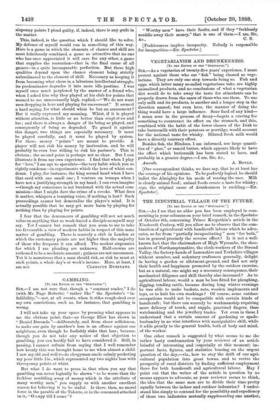GAMBLING.
[To THE EDITOR OF THE "SPECTATOR,"]
Sra,—I am not sure that, though a "constant reader," I do (with Mr. Page Roberts) "rather like" the Spectator's " in- -Folibility,"—not, at all events, when it rides rough-shod over my own convictions, such as, for instance, that gambling is wrong.
I 'Will not take up your space by pressing what appears to me the obvious point, that—as George Eliot has shown in "Daniel- Deronda,"—deliberately, and from sheer selfishness, to make our gain by another's loss is an offence against our neighbour, even though he foolishly risks that loss ; because, though you do not take any notice of that objection to gambling, you can hardly fail to have considered it. Still, in passing, I cannot refrain from saying that I well remember how keenly this was brought home to me when almost a child. I saw my old and well-to-do clergyman-uncle calmly pocketing my poor little 15s., which represented my two nights' loss with threepenny points at whist.
But what I do want to press is, that when you say that gambling can never logically be shown "to be worse than the feckless muddling away of money which is the attribute of many worthy men," you supply us with another excellent reason for believing it to be sinful. Is there, then, no moral force in the parable of the Talents, or in the command attached to it, " 0 acupy till I come"? "Worthy men" have their faults, and if they "fecklessly muddle away their money," that is one of them.—I am, Sir, C. S.
[Fecklessness implies incapacity. Nobody is responsible for incapacities.—En. Spectator.]


































 Previous page
Previous page